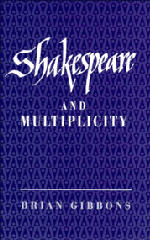Book contents
- Frontmatter
- Contents
- Acknowledgements
- 1 Introduction
- 2 Fabled Cymbeline
- 3 A speechless dialect: interpreting the human body in Shakespeare's plays
- 4 Shakespeare's ‘road of excess’: Titus Andronicus, The Taming of the Shrew, King Lear
- 5 Always topical: Measure for Measure
- 6 Amorous fictions in As You Like It
- 7 Unstable Proteus: Marlowe and Antony and Cleopatra
- 8 Multiplicity
- Notes
- Bibliography
- Index
- Frontmatter
- Contents
- Acknowledgements
- 1 Introduction
- 2 Fabled Cymbeline
- 3 A speechless dialect: interpreting the human body in Shakespeare's plays
- 4 Shakespeare's ‘road of excess’: Titus Andronicus, The Taming of the Shrew, King Lear
- 5 Always topical: Measure for Measure
- 6 Amorous fictions in As You Like It
- 7 Unstable Proteus: Marlowe and Antony and Cleopatra
- 8 Multiplicity
- Notes
- Bibliography
- Index
Summary
There is a sense of great abundance in Shakespeare's plays – so much so, indeed, that in every generation there are interpreters who cut and simplify, unable to cope with the wealth of ideas and experiences in the plays, or supposing their audiences incapable of doing so. I believe, on the contrary, that abundance is a great strength of Shakespeare's plays, that they are designed deliberately to expand the mind – to generate a sense of concentrated vigorous life in emotions and ideas, to promote as multiple an awareness as possible of differing facets of a story; and that this aim, already discernible in Shakespeare's earliest work, is at the core of his development, and of his power and distinctiveness as an artist.
My aim in this book is to take some examples which focus on Shakespeare's art of translating – or better, transfiguring – material into the three-dimensional language of theatre. Each new Shakespeare play is to a certain extent a ‘reading’ of material from other books and plays – and, it should be stressed, this usually includes plays he had himself already written. The plays he used as sources offered a visual dimension, presenting their narratives not only in words but in practicable stage action and stage images, and these Shakespeare noted with care; yet even when he read the most unpromising kinds of prose chronicle his dramatist's instinct for selection is evident: he had an eye for the telling action no less than the telling phrase: he made a narrative visual as well as verbal, and his plays, when acted, present stage metaphors which can equal those in the spoken text.
- Type
- Chapter
- Information
- Shakespeare and Multiplicity , pp. 1 - 17Publisher: Cambridge University PressPrint publication year: 1993



